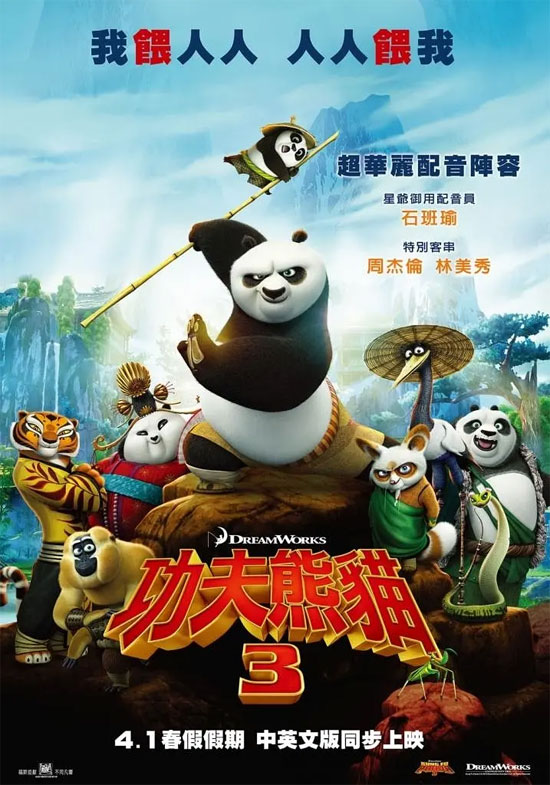Film Name: 功夫熊猫3 / Kung Fu Panda 3

The collective appearance of the pandas ushered in a season of vibrant cherry blossoms across the Kung Fu Panda universe, yet it also signaled that the end was drawing near. Po’s uniqueness as the sole panda is shattered—a double-edged sword. One edge delivers the collective cuteness overload of adorable creatures filling the screen, while the other brings the exhaustion of expectations from Po’s fully revealed origins. Weighing the two, the former offers immediate gratification, while the latter promises lasting value.
This differs fundamentally from the collective cuteness of the Minions. Though the Minions, first introduced in Despicable Me, also possess both individual and group charm, they remain supporting characters. Po, however, has been the singular panda protagonist throughout the first two Kung Fu Panda films. The film expends considerable effort and detail in portraying the distinct personalities of multiple pandas, yet the more pronounced their individual traits become, the more they diminish Po’s value.
Regardless, Po’s father’s discovery of him felt far too easy—so effortless that it shattered the ultimate mystery woven into the Kung Fu Panda series since 2008 like a fragile glass sphere. The suspense and emotions it contained spilled everywhere, impossible to gather back up.
I had hoped Po’s panda father would turn out to be a father who mistook him for someone else, accidentally leading Po to a clan that ultimately wasn’t his own, leaving him alone once more with only a “homelike” impression in his heart. Sadly, that man was indeed his father. The story merely dwells on the sorrow of Po’s biological father losing both his son and beloved wife. Beyond a big hug, a well-intentioned lie, and a brief monologue before a small memorial photo, his love for his son is never expressed through any truly memorable actions.
The film’s dazzling visuals and spectacular action sequences cannot mask how pale Po’s biological father’s love appears compared to that of Goose Dad. Po accepts this new father without resistance, embraces the fellow pandas who forcefully enter his life, and remains completely neutral between his old and new fathers. This unconditional acceptance raises questions: does it stem from genuine inner tolerance, or from an unrealistic simplification? In terms of father-son relationship dynamics, Kung Fu Panda 3 falls short even compared to “Fruity Robo The Great Escape.”
Truthfully, every antagonist in the Kung Fu Panda films is a rather dull character—thoroughly evil, relentlessly pursuing the protagonist until their own self-destruction. Fortunately, Po always finds new perspectives—this time, embracing his true self. Yet his ultimate victory over the formidable foe doesn’t stem from personal enlightenment, but collective assistance. Only after everyone channels their chi into the sealed Po does he gain his kung fu powers. This plot device diminishes the protagonist’s agency in overcoming challenges.
Overall, this is a visually stunning, fluidly paced, and richly colored film that delivers an immensely enjoyable viewing experience. While the narrative about the father lacks an epic reunion and a truly memorable, weighty speech, the overall impression is outstanding.
Please specify:Anime Phone Cases » Kung Fu Panda 3 2016 Animation Film Review: A father is a double-edged sword.